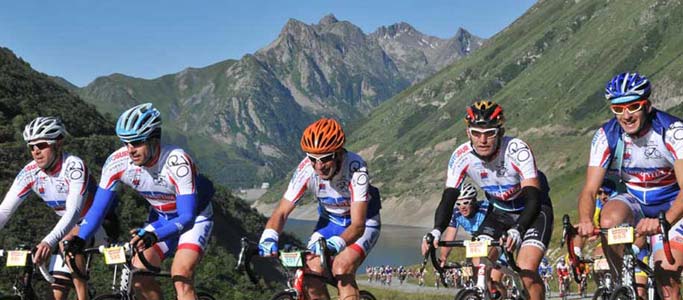Cycling Climbing Training – How to Climb Hills Better
Cycling climbing training is often one of the areas cyclists avoid when considering their cycling training plan. However by including regular cycling climbing training sessions into your cycling training schedule you can soon turn a weakness into a strength and source of confidence.
Whether you are commuting to work, taking on a European sportive or getting fit for a cycling holiday, these cycling climbing training tips will show you how to climb better on your bike.
Cycling Climbing Technique
Most sportives will have at least one hill that you look at on the profile and fear. If you are riding the epic Alpenbrevet cycling challenge in Switzerland you will have over 7,000 metres of climbing to practice on!
The key to cycling in the mountains is accepting that the climb is going to go on for a while and possibly be followed by others so it’s best to get into a rhythm and save energy rather than trying to emulate your favourite Tour de France rider. The best way to establish a rhythm that can be sustained is by cycling with a high cadence or spinning the pedals more quickly in a lower gear.
Climbing Hills with a High Cadence is Easier
Coach Chris Carmichael demonstrates in this climbing skills video how to use a high climbing cadence to break down the task of climbing the hill into more manageable chunks. As a result you fatigue the muscles less and increase the chance that they’ll still be willing to work for you on the final climb of the day.
Anticipate the Terrain
If you look at the stem of a pro riders bike before a one day classic or mountain stage in a Grand Tour, they will have the key climbs marked out on a piece of tape or paper stuck to the stem. This so they can measure their effort out over the course of the day and not go too hard too early
- Whether it’s a club ride, a day out cycling with mates or a cyclosportive make sure you check out the route the night before
- Note down the distance marker for each climb and where feed stations/coffee stops are on some tape and fix it to your stem
- Measure out your efforts, use your gears as you anticipate the changes in terrain and you’ll climb the last climb as fast as the first climb
Cycling Climbing Tips
These top tips will help you maintain a high climbing cadence and conserve energy:
Stay relaxed: Monitor yourself regularly to relax and save energy; are you wasting energy by gripping the handlebars too tight? Grimacing or clenching your jaw? Holding your breath then recovering with shallow panicked breaths? All the above? Do the opposite!
Arms bent: Keeping your arms slightly bent rather than locked out it will help absorb shocks from the road and reduce fatigue
Hands on the hoods: Having your hands on the brake hoods gives you better leverage
Keep seated: When the gradient allows keep seated, you can generate power more consistently over longer periods in the seated position. As your leg power and muscular endurance improves the gradient at which you are forced to get out of the saddle will increase
Change is good: Change your hand position and climbing style around during the day to give your arms, shoulder and back muscles a rest/change and to bring different leg muscles into play
Cut the hairpin: When space allows taking a line from the outside of the hairpin to the inside will often flatten the turn and give you a little breather
Stand up: When the terrain gets steep or if your body just instinctively wants to stand on the pedals for a while go with the flow – it will give your muscles a change of scene and help flush out toxins too by increasing the heart rate
Cycling Climbing Training
Your cycling training plan should have specific hill training sessions every week. It will help give you confidence and the increase in leg power will help you on the flats too. Of course what goes up must go down, so cycling climbing training will help improve your descending technique too.
Hill Training Intervals
Cycling coach Chris Carmichael recommends including hill climbing interval sessions into your climbs.
- 6 minute intervals
- 2 minutes at a pace that stretches you but you can sustain for 2 minutes
- 1 minute above threshold effort
- 2 minutes at a pace that stretches you but you can sustain for 2 minutes
- 1 minute above threshold effort
- 6 minutes recovery
- Repeat!
Climbing Repeats
Choosing a local hill that you can do hill climbing repeats on will help you improve performance and also give you a benchmark test to measure your progress.
- Choose a local hill with a steady gradient
- Choose a gear and pace that allows steady effort
- Work at just below your lactate threshold – (Zone #4 Rate of Perceived Exertion 15 “Difficult to Talk”)
- If your doing an effort of 8 minutes give yourself 8 minutes recovery
Cycling Training Plan
Our free 12 week cycling training plan includes tips from our Pro Cycling Academy as well as a structured training pain that is perfect for getting you fit for a sportive or cycling challenge.
Sportive Cycling Holidays in The Alps
Our cycling sportive holiday feature Swiss cycling sportives, so if you are training for a big challenge like the Marmotte or Etape du Tour then get race fit by training in the Alps on a Brevet cycling tour.
Sportive Training Plan
Are you in training for a sportive? Use our free 12 week Sportive Training Plan to get you in the best possible shape for your sportive challenge. Simply fill the form below and we’ll send you your free training plan:
[hr]
Photo Credit: Alpenbrevet


Keith
Tom Eeles
Angie
Tom Eeles
AnthQ
Tom Eeles